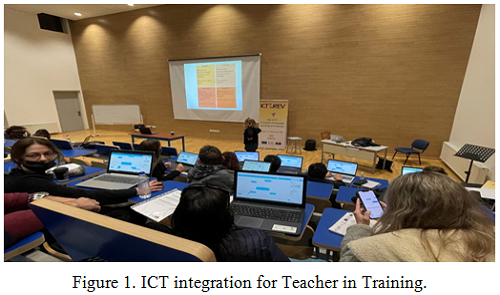
Planning and Integration of ICT on Teacher Education Professional Development for Enhancing Teaching and Learning of Yoruba Migrated Indigenes of Lagos State in Diaspora
Abstract
Keywords
Full Text:
PDFReferences
Abdelgadir, K. E. (2000). ICT as Enabler for Economic Growth, Knowledge Diffusion and Social Inclusion. Paper presented at ICT Workshop held in Trieste, Italy. 1 – 2 October, 2004.
Cartwright, V. & Hammond, M. (2013). The integration and embedding of ICT into the school curriculum: more questions than answers. Paper presented at the ITTE 2003 Annual Conference of the Association of Information Technology for Teacher Education, Trinity and All Saints College, Leeds.
Herzig, R. G. M. (2014). Technology and its impact in the classroom. Computers & Education, 42(2), 111-131.
Joy, N., & Ishikaku, E. C. (2020). Integration of Information and Communication Technology (ICT) in Teacher Education for Capacity Building. Journal of Education and Practice, 3(10), 68-74.
Kashorda, M., Waema, T., Omosa, M., & Kyalo, V. (2019). E-Readiness Survey of Higher Education in Kenya. Kenya Education Network (KENET),
Nairobi. Kashorda, M., Waema, T., Omosa, M., and Kyalo, V. (2007). E-Readiness Survey of Higher Education in Kenya. Kenya Education Network (KENET), Nairobi.
Lachs, V. (2010). Making Multimedia in the Classroom. A Teacher’s guide. London: Rutledge Falmer.
Lau, B. T. & Sim, C. H. (2018). Exploring the extent of ICT adoption among Secondary School Teachers in Malaysia. International Journal of Computing and ICT Research, II(II), 19(36).
Lim, C. P. & Ching, C. S. (2014). An activity-theoritical approach to research of ICT integration in Singapore schools. Orienting activities and learner autonomy. Computers and Education, 43, 215-236.
Lim, C. P., Swe, K. M., Hew, T., Wong, P., & Shanti, D. (2013). Exploring critical aspects of information technologies integration in Singapore schools. Australian Journal of Educational Technology, 19(1), 1-24.
Majumdar, S. (2016). Emerging trends in ICT for education & training. Retrieved May 31, 2014
Manzuoli, C. H., & Cifuentes, Y. S. (2019). Computing education competence in Higher Education: challenges for teachers. American Journal of Educational Research, 1(9), 406-412.
Olisa, M. S. & Obiukwu, J. I. (1992). Rural Development in Nigeria: Dynamism and Strategies. Awka, Anambra, Nigeria: Mekslink publishers.
Omwenga, E. I. (2016). Pedagogical issues and e-learning cases: integrating ICTs into teaching and learning process. School of Computing and Informatics, 1-11. Retrieved February 15, 2014
Oshun, G. O (2007). The need for information and communication in Teacher Education in Journal of Research in Educational Management. Volume 1 No. 3. Lagos, Micodex Nig. Limited.
Richards, C (2017). Towards an Integrated Framework for Designing Effective ICT‐Supported Learning Environments: The Challenge to Better Link Technology and Pedagogy, Technology, Pedagogy and Education, 15(2), 239-255
Roblyer, M. D., & Edward, J. (2018). Integrating Educational Technology into Teaching. New Jersey: Prentice Hall
Shirin, M. (2014). Evaluating the Developmental impact of E-Governance Initiates: An exploration framework. The electronic journal system in Developing Countries (EJISDC). 20(5) 1-13.
Thompson, R., & Cat-Basil, W. (2013). Information technology and lanaL,ement-I’d edu. New York: McGraw Hill Arwin
UNESCO (2012). Towards Knowledge Societies. UNESCO World Report 2005. Paris.
Wang, Q. (2018). A generic model for guiding the integration of ICT into teaching and learning. Innovations in Education and Teaching International, 45(4) 411–419.
DOI: http://dx.doi.org/10.31258/jes.6.4.p.511-522
Refbacks
- There are currently no refbacks.
Copyright (c) 2022 Emmanuel Semako GBESOEVI, Hendeweh Dorcas HUNPEGAN, Jide Pius GBENU

This work is licensed under a Creative Commons Attribution 4.0 International License.
Publisher: FKIP Universitas Riau












